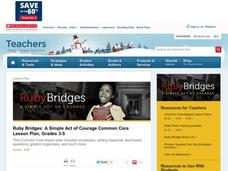New York City Department of Education
Peter’s Garden
Watch scholars' understanding of fractions bloom. The resource presents a performance task where the fractions are equal parts from the same whole, and mathematicians must use them to solve problems about a grade level garden. Teachers...
Science Matters
Island Fox Outreach
Off the coast of California lives a wild animal called the Island Fox. Experts discuss the importance of the Island Fox to the Channel Islands and the balance the fox creates within its ecosystem. The lesson concludes with a reading of...
Morningside Center
Activities to Close the School Year
Students participate in end of the school year activities. In this reflective lesson, students take part in a closing circle, journaling, weaving a web, and hopes and expectations activities to reflect on what they have learned.
Museum of Tolerance
Music Evokes Memories and Emotions
Dim the lights, take a deep breath, and press play to explore the emotions and memories that music elicits. Class members begin using relaxation techniques designed to create a positive listening experience. As music plays, learners...
Scholastic
Ruby Bridges: A Simple Act of Courage, Grades 3-5
Through character trait graphic organizers, a vocabulary sorting activity, class discussion, and a civil rights movement slide show, your young historians will be introduced to the amazing story of Ruby Bridges and her experiences as the...
Curated OER
Animals Galore
A well-designed lesson which covers the characteristics of the animals found in the six animal groups is here for your young biologists. In it, learners divide up into six groups; the amphibians, reptiles, mammals, birds, fish, and...
Curated OER
From Past to Present
Here is an impressive lesson on how agricultural practices and technology have advanced over time. Thoughtful discussion topics, good warm up activities, and fine worksheets are all embedded in this eight-page plan. The plan comes from...
Museum of Tolerance
Oral History Activity
Oral history has brought a multitude of lessons, stories, and factoids to our current knowledge of the past. Let us continue to use oral history traditions through a activity that encourages pupils to discover and appreciate where they...
Museum of Tolerance
Immigration Journeys
Through the journey of four stories of immigration, scholars complete graphic organizers and apply knowledge to create a visual representation of their findings on a large poster. Third and fourth readers write a letter to their family...
Museum of Tolerance
Family Role Model Activity
What does is take to be a role model? Through grand conversation, and the use of books and a graphic organizer, scholars find out and apply the requirements to identify a role model within their family. They then journey through the...
Curated OER
Patriotic Symbols of the United States
Young historians take a close look at the most famous patriotic symbols of the United States and determine what they actually stand for. Symbols such as Uncle Sam, The Statue of Liberty, The Bald Eagle, and The Liberty Bell are studied....
Curated OER
Exploring Owls
What can young scientists discover from dissecting an owl pellet? Explore the owl food chain, beginning with an introduction to these predatory birds. Suggested strategies here include creating a podcast and purchasing a poster, however...
Illinois Department of Natural Resources
Section One: What is Biodiversity?
Four intriguing and scientific activities invite learners to explore the natural resources of their town. The activities cover concepts such as genetic traits, organizing species in a taxonomy, the differences between different species...
Channel Islands Film
Dark Water: Lesson Plan 1 - Grades 3-4
As part of their study of the history of the Channel Islands, class members craft an informational article to post on a bulletin board that features the Chumash ancestral tradition of tomol paddling.
Japan Society
Tanabata: Japan's Star Festival
The Star Festival or Tanbata, is a holiday celebrated in Japan every year. People make tanzakus out of paper and hang them on the trees. Pupils will learn about this culturally significant holiday while creating tanzakus of their own....
New Jersey Historical Commission and New Jersey Council for the Humanities
Thomas Edison: The Wizard of Menlo Park
What would change in your daily life due to a power outage? Here, learners explore the inventions brought to us by the one and only, Thomas Edison, and imagine a day without them. Scholars take part in a grand conversation and write a...
New York City Department of Education
Chris’ Garden Dilemma
Make the connections between area, tiling, and multiplication. A performance task and associated unit presents the concept of area and makes the connection to multiplication. Pupils work through three major sections of instruction that...
Alabama Learning Exchange
Systems Every "Body" Needs to Know
Through an informative WebQuest and group work, learners explore the human body and cell structure. They create a cell diagram, research a disease, write a letter explaining the causes of human disease, and work in small groups to create...
Nazareth College
Create Your Own Tornado
Third graders identify key concepts and definitions about tornados. They work in small groups of three to four to create mini-tornados. After reading Tornado Alert as a class, 3rd graders discuss tornados and fill out a KWL chart.
Other popular searches
- English Language Arts
- English Language Arts Exam
- English Language Arts Games
- Deaf English Language Arts
- English Language Arts Music
- English Language Arts Heroes
- English Language Arts Skills
- English Language Arts Grade 3
- English/language Arts
- English Language Arts Poetry
- English Language Arts Rating=3
- English Language Arts Unit Sc




















